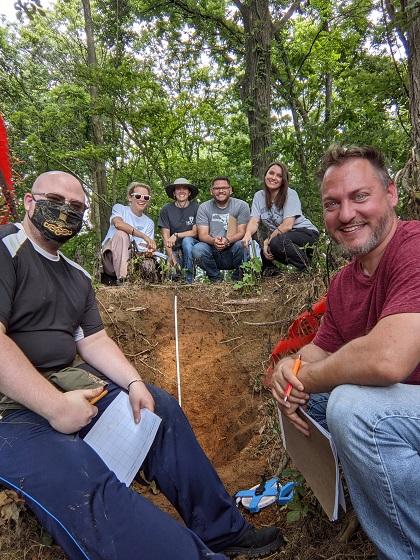
About this Program
Unlike one-size-fits-all programs, the geographic information systems certificate program is precisely focused on environmental biology. The program builds high-demand expertise in the use of computerized cartography and spatially referenced databases. In fact, most job postings in the field include GIS as an emphasis and even as a qualification requirement.
Program Overview
Tuition & Fees
Funding Opportunities
Download Environmental Biology Brochure
Unravel Pressing Problems
GIS skills provide an increasingly critical visual bridge in communications between bioscience and policymakers, as well as nonprofits and stakeholders. Hood’s program equips students to support the decision-making and analysis entailed in urgent conservation efforts, natural resource management, climate change and more.
Master the Preeminent Software
Coursework begins with a core introduction to prevalent environmental issues. Students delve into the applications and informed use of GIS in resource conservation and insect, fresh water and invasive species ecology. Hands-on practice hones proficiency with ArcGIS, remote sensing imagery and other cutting-edge technology. Capacity-building experiences include capturing and managing multiple types of geographic data, assessing relationships, measuring change and modeling events.
Learn While You Work
The 18-credit program’s small, evening classes offer the advantage of individual attention and the flexibility to continue working by day. Beyond the campus, close ties with NASA/Goddard, Maryland’s Department of Natural Resources and more afford access to top minds in the profession.
Please note that graduate certificate programs are now eligible for loans.
Degrees Offered
- Certificate
Related Graduate Programs
Are you ready to go further?
For students applying to the certificate in geographic information systems (GIS) program, please submit the following to the Graduate School:
- One copy of official transcripts from each institution attended.
- An essay (550 words or less) that includes background experience and future goals.
Applicants who have an undergraduate GPA below 3.0, must also submit the following:
- Two letters of recommendation. Letters can be emailed to gofurther@hood.edu.
Prerequisites for Admission
It is recommended that entering students have completed undergraduate course work in the following:
- Biology (Two semesters, with lab)
- Chemistry (Two semesters, with lab)
- Mathematics (One semester)
Transfer credit policy for admitted students
Students may transfer a maximum of 6 graduate credits from an external, accredited institution, or another Hood graduate program prior to the first semester of study in the current program. Please review the full graduate transfer credit policy in the College catalog.
Required Core Courses (9 credits)
ENV 501 Introduction to Environmental Biology (3 credits)
ENV 502 Principles of Ecology (3 credits)
ENV 526G Introduction to GIS Mapping (1 credit)
ENV 526H Introduction to GIS Analysis (1 credit)
ENV 526I Introduction to Remote Sensing (1 credit)
Electives (minimum of 9 credits):
Once students successfully complete ENV 526G and 526H and meet all the prerequisites for a given course, students will select an additional 9 credits of GIS electives. The elective courses will require a major GIS-related project or paper in order to receive certificate credit.
ENV 503 Pollution Biology (3 credits)
ENV 506 Environmental Microbiology (3 credits)
ENV 507 Natural Resource Management (3 credits)
ENV 509 Ecological Invasions and Biological Control (3 credits)
ENV 511 Conservation Biology (3 credits)
ENV 512 Insect Ecology (3 credits)
ENV 513 Marine Ecology (3 credits)
ENV 563 Freshwater Ecology (3 credits)
ENV 564 Environmental Toxicology (3 credits)
ENV 577 Climate Change (3 credits)
9-12 Months
Average Completion Time
18 Total Credits
Program Contact

Program Director

Assistant Director of Graduate Admission & Data Management

Graduate Program Focus | Methods in Soil Ecology
"One of the things I love about soil science is that it is applicable on many scales. All of my students are now equipped to improve the health and fertility of the soil in their surroundings, whether that be through their work, research projects, internship experiences, or just in their own backyards."

Graduate Student Spotlight | Christopher Burch
"With most of the classes offered at night, and even some online, the Hood College program was perfect! It was flexible with my work schedule. It was close to home. It had all the courses I wanted to take, and best of all, the price was very affordable compared to any of the other schools I explored."

Faculty Spotlight | Emily Southgate, Hood Senior Scholar
Emily Southgate teaches in Hood College's Coastal and Watershed Studies Program as a Senior Scholar.




